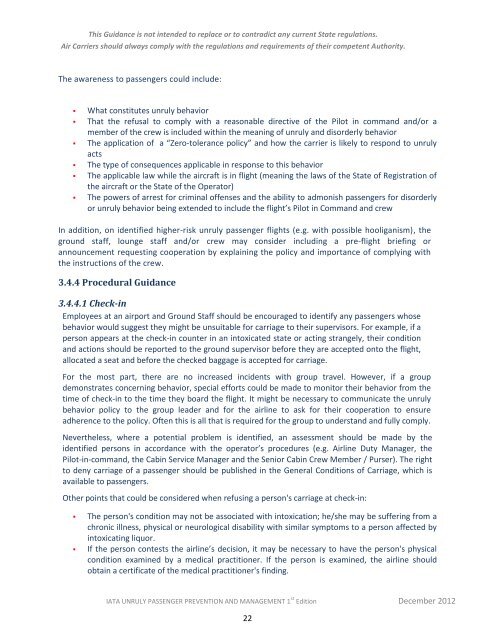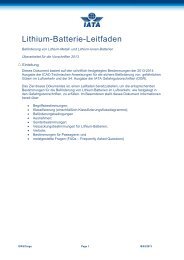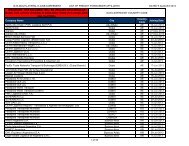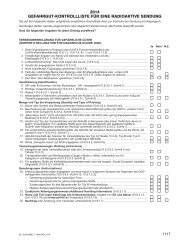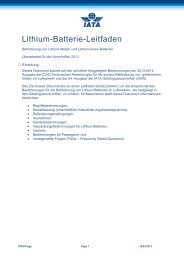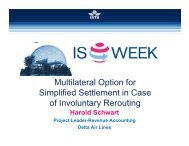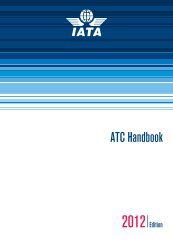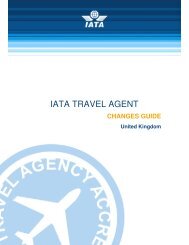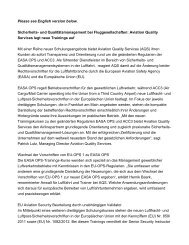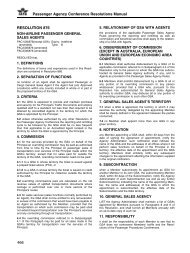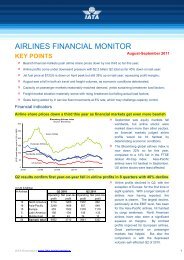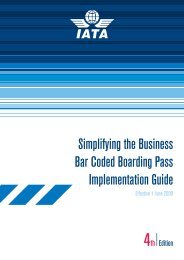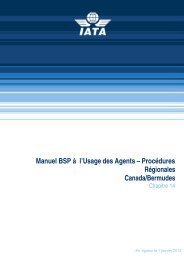Guidance on Unruly Passenger Prevention and Management - IATA
Guidance on Unruly Passenger Prevention and Management - IATA
Guidance on Unruly Passenger Prevention and Management - IATA
You also want an ePaper? Increase the reach of your titles
YUMPU automatically turns print PDFs into web optimized ePapers that Google loves.
This <str<strong>on</strong>g>Guidance</str<strong>on</strong>g> is not intended to replace or to c<strong>on</strong>tradict any current State regulati<strong>on</strong>s.<br />
Air Carriers should always comply with the regulati<strong>on</strong>s <strong>and</strong> requirements of their competent Authority.<br />
The awareness to passengers could include:<br />
What c<strong>on</strong>stitutes unruly behavior<br />
That the refusal to comply with a reas<strong>on</strong>able directive of the Pilot in comm<strong>and</strong> <strong>and</strong>/or a<br />
member of the crew is included within the meaning of unruly <strong>and</strong> disorderly behavior<br />
The applicati<strong>on</strong> of a “Zero-tolerance policy” <strong>and</strong> how the carrier is likely to resp<strong>on</strong>d to unruly<br />
acts<br />
The type of c<strong>on</strong>sequences applicable in resp<strong>on</strong>se to this behavior<br />
The applicable law while the aircraft is in flight (meaning the laws of the State of Registrati<strong>on</strong> of<br />
the aircraft or the State of the Operator)<br />
The powers of arrest for criminal offenses <strong>and</strong> the ability to adm<strong>on</strong>ish passengers for disorderly<br />
or unruly behavior being extended to include the flight’s Pilot in Comm<strong>and</strong> <strong>and</strong> crew<br />
In additi<strong>on</strong>, <strong>on</strong> identified higher-risk unruly passenger flights (e.g. with possible hooliganism), the<br />
ground staff, lounge staff <strong>and</strong>/or crew may c<strong>on</strong>sider including a pre-flight briefing or<br />
announcement requesting cooperati<strong>on</strong> by explaining the policy <strong>and</strong> importance of complying with<br />
the instructi<strong>on</strong>s of the crew.<br />
3.4.4 Procedural <str<strong>on</strong>g>Guidance</str<strong>on</strong>g><br />
3.4.4.1 Check-in<br />
Employees at an airport <strong>and</strong> Ground Staff should be encouraged to identify any passengers whose<br />
behavior would suggest they might be unsuitable for carriage to their supervisors. For example, if a<br />
pers<strong>on</strong> appears at the check-in counter in an intoxicated state or acting strangely, their c<strong>on</strong>diti<strong>on</strong><br />
<strong>and</strong> acti<strong>on</strong>s should be reported to the ground supervisor before they are accepted <strong>on</strong>to the flight,<br />
allocated a seat <strong>and</strong> before the checked baggage is accepted for carriage.<br />
For the most part, there are no increased incidents with group travel. However, if a group<br />
dem<strong>on</strong>strates c<strong>on</strong>cerning behavior, special efforts could be made to m<strong>on</strong>itor their behavior from the<br />
time of check-in to the time they board the flight. It might be necessary to communicate the unruly<br />
behavior policy to the group leader <strong>and</strong> for the airline to ask for their cooperati<strong>on</strong> to ensure<br />
adherence to the policy. Often this is all that is required for the group to underst<strong>and</strong> <strong>and</strong> fully comply.<br />
Nevertheless, where a potential problem is identified, an assessment should be made by the<br />
identified pers<strong>on</strong>s in accordance with the operator’s procedures (e.g. Airline Duty Manager, the<br />
Pilot-in-comm<strong>and</strong>, the Cabin Service Manager <strong>and</strong> the Senior Cabin Crew Member / Purser). The right<br />
to deny carriage of a passenger should be published in the General C<strong>on</strong>diti<strong>on</strong>s of Carriage, which is<br />
available to passengers.<br />
Other points that could be c<strong>on</strong>sidered when refusing a pers<strong>on</strong>'s carriage at check-in:<br />
The pers<strong>on</strong>'s c<strong>on</strong>diti<strong>on</strong> may not be associated with intoxicati<strong>on</strong>; he/she may be suffering from a<br />
chr<strong>on</strong>ic illness, physical or neurological disability with similar symptoms to a pers<strong>on</strong> affected by<br />
intoxicating liquor.<br />
If the pers<strong>on</strong> c<strong>on</strong>tests the airline’s decisi<strong>on</strong>, it may be necessary to have the pers<strong>on</strong>'s physical<br />
c<strong>on</strong>diti<strong>on</strong> examined by a medical practiti<strong>on</strong>er. If the pers<strong>on</strong> is examined, the airline should<br />
obtain a certificate of the medical practiti<strong>on</strong>er's finding.<br />
<strong>IATA</strong> UNRULY PASSENGER PREVENTION AND MANAGEMENT 1 st Editi<strong>on</strong> December 2012<br />
22


